“War is a racket. It always has been. It is possibly the oldest, easily the most profitable, surely the most vicious. It is the only one international in scope. It is the only one in which the profits are reckoned in dollars and the losses in lives.” – General Smedley Butler

I don’t need your civil warIt feeds the rich while it buries the poorYour power hungry sellin’ soldiersIn a human grocery store
Whether it is a distinguished general who came to his senses in 1935, after doing the bidding of the monied interests by initiating conflict throughout the world to fill their coffers with blood money, or a rock & roll star fifty years later writing a hit song about the exact same theme, the song remains the same. The wealthy always benefit from war, the poor always die in their wars, and politicians are bribed to continually foment conflict, hate, and railing against whoever their puppet masters choose as the enemy of the moment. This is not a recent development, it has spanned centuries, just the sums of money feeding the military industrial complex are now astronomical.









